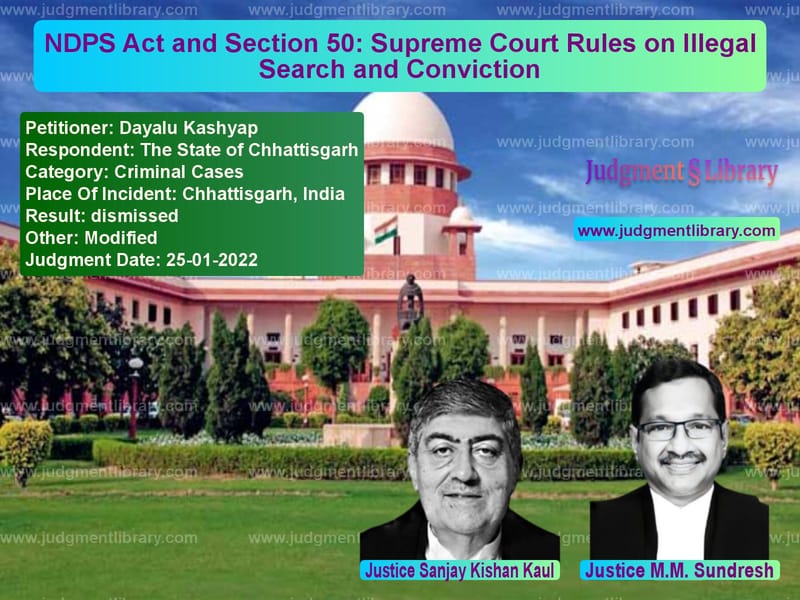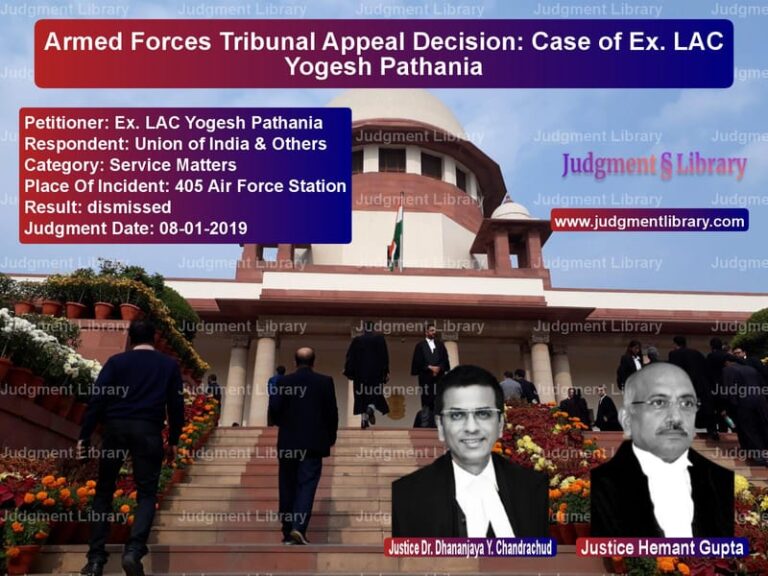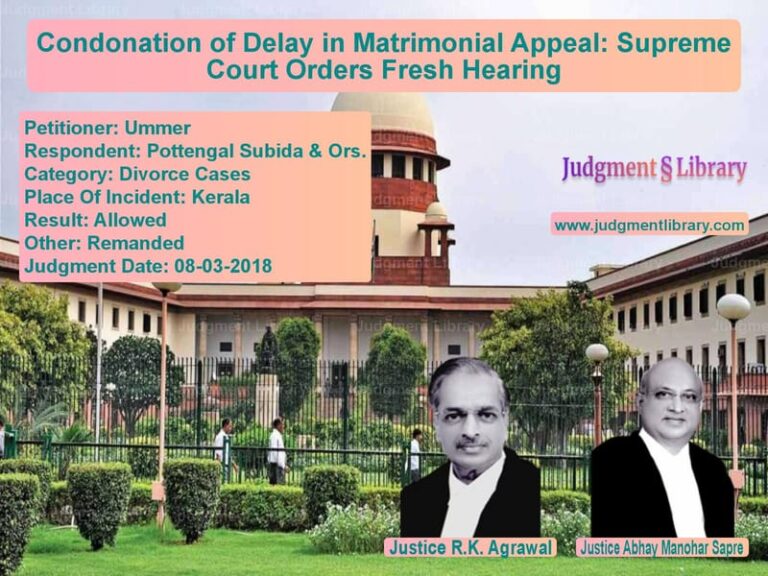NDPS Act and Section 50: Supreme Court Rules on Illegal Search and Conviction
The case of Dayalu Kashyap v. The State of Chhattisgarh involved an appeal against a conviction under the Narcotic Drugs and Psychotropic Substances Act, 1985 (NDPS Act). The appellant was sentenced to ten years of rigorous imprisonment for possession of ganja (cannabis) and challenged the legality of the search conducted by the police under Section 50 of the NDPS Act.
Background of the Case
The incident occurred on September 11, 2010, at around 10:30 AM, when Sub-Inspector K.S. Singh (PW-5) received information about a person carrying ganja in a green polythene bag on a wooden Kanwad from Bhaisabeda to Pithapur. The appellant was intercepted, searched, and subsequently charged under Section 20(b)(ii)(C) of the NDPS Act for possession of contraband.
The Special Judge convicted the appellant and sentenced him to 10 years of rigorous imprisonment with a fine of ₹1 lakh. Upon failure to pay the fine, the appellant was required to serve an additional one-year imprisonment. The conviction was upheld by the High Court of Chhattisgarh on March 28, 2019, leading the appellant to file an appeal before the Supreme Court.
Arguments of the Petitioner (Dayalu Kashyap)
- The police failed to comply with Section 50 of the NDPS Act, which mandates that a person must be informed of their right to be searched in the presence of a Gazetted Officer or Magistrate.
- The police officer improperly provided a third option to the accused—to be searched by the police officer himself—contrary to the statutory requirement.
- The improper search vitiated the entire conviction, as the recovery of contraband was invalid.
- Since the appellant had already served ten years and an additional six months for non-payment of the fine, the remaining sentence should be quashed.
Arguments of the Respondent (State of Chhattisgarh)
- The search was conducted in compliance with the NDPS Act, and the accused had verbally consented to be searched by the officer.
- The accused was carrying ganja in a polythene bag on a Kanwad (a wooden structure), which was not on his person, making Section 50 inapplicable.
- The conviction was based on substantial evidence, including the testimony of PW-5 (Sub-Inspector K.S. Singh), which confirmed the recovery of the contraband.
- The sentence imposed by the trial court was proportionate to the gravity of the offense.
Key Observations of the Supreme Court
1. Applicability of Section 50 of the NDPS Act
The Supreme Court noted that Section 50 of the NDPS Act applies when the contraband is recovered from a person’s body. However, in this case, the contraband was found in a bag on a Kanwad, not on the appellant’s person.
The Court cited previous judgments, stating:
“Since the recovery was not from the appellant’s body but from a polythene bag, the strict compliance of Section 50 was not required.”
2. Improper Notice Under Section 50
The Court examined the testimony of PW-5 and found that the accused was given an additional option—to be searched by the police officer himself—which is not provided under Section 50. The Court reiterated:
“The accused should have been given a clear choice: to be searched before a Gazetted Officer or a Magistrate. Providing an additional option vitiates the statutory safeguard.”
3. Impact on the Conviction
Despite the flaw in the Section 50 notice, the Court held that the search was still valid as the recovery was made from a bag and not from the accused’s body. The Court refused to extend the rule to invalidate recoveries from bags or belongings.
“Failure to properly inform the accused under Section 50 does not automatically vitiate the conviction when the recovery is from a bag and not from the person.”
4. Sentence Reduction
The Court noted that the appellant had already served ten years and an additional six months due to non-payment of the fine. Considering this, the Court modified the sentence:
“The remaining imprisonment for non-payment of the fine is reduced, and the appellant is ordered to be released.”
Final Judgment
The Supreme Court dismissed the appeal but reduced the remaining sentence for non-payment of the fine. The key takeaways from the judgment are:
- Section 50 of the NDPS Act applies only when the contraband is recovered from a person’s body.
- Providing an extra option beyond a Gazetted Officer or Magistrate in the Section 50 notice is improper but does not automatically invalidate the conviction.
- When contraband is recovered from a bag or external possession, non-compliance with Section 50 does not vitiate the recovery.
- Since the appellant had already served most of his sentence, the remaining sentence for non-payment of the fine was waived.
This ruling clarifies the scope of Section 50 in narcotics cases and limits the extent of judicial intervention in technical violations of search procedures.
Petitioner Name: Dayalu Kashyap.Respondent Name: The State of Chhattisgarh.Judgment By: Justice Sanjay Kishan Kaul, Justice M.M. Sundresh.Place Of Incident: Chhattisgarh, India.Judgment Date: 25-01-2022.
Don’t miss out on the full details! Download the complete judgment in PDF format below and gain valuable insights instantly!
Download Judgment: dayalu-kashyap-vs-the-state-of-chhatti-supreme-court-of-india-judgment-dated-25-01-2022.pdf
Directly Download Judgment: Directly download this Judgment
See all petitions in Drug Possession Cases
See all petitions in Bail and Anticipatory Bail
See all petitions in Judgment by Sanjay Kishan Kaul
See all petitions in Judgment by M.M. Sundresh
See all petitions in dismissed
See all petitions in Modified
See all petitions in supreme court of India judgments January 2022
See all petitions in 2022 judgments
See all posts in Criminal Cases Category
See all allowed petitions in Criminal Cases Category
See all Dismissed petitions in Criminal Cases Category
See all partially allowed petitions in Criminal Cases Category







